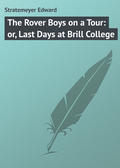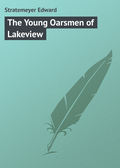
Stratemeyer Edward
The Campaign of the Jungle: or, Under Lawton through Luzon
CHAPTER V
AN ENCOUNTER AT THE RIVER
To say that both Larry and his old friend were surprised at the sudden demand which had been made upon them would be to put the truth very mildly. They had been of the firm belief that the insurgents had retreated, and to find themselves in a “reg’lar hornet’s nest,” as Luke afterward expressed it, dumfounded them.
“Do you surrender, or not?” came the words, after an awkward pause.
It was dark about the huts, yet not so dim but that they could see the barrels of several Mauser rifles thrust toward them. The sight made Larry shiver, for he had never before met the rebel soldiers at such close quarters.
“We’re in a box,” muttered Luke. “Somethin’ wrong somewhar – our soldiers didn’t come this way, ye kin reckon on thet.”
“I move we run for it,” whispered Larry. “If they take us prisoners – ” He did not finish, but his silence was more impressive than mere words would have been. He had heard many stories of terrible cruelty practised by the insurgents on their prisoners, and whether these tales were true or not, they had had their full effect on both him and his shipmates.
“Where are ye goin’ to run to, lad? We don’t want to run an’ be shot down in cold blood.”
“Get in front of me and take to the woods opposite, Luke,” was the hurried reply. “Here goes! I don’t think they’ll fire now!”
As Larry concluded, he sprang to the side of one of the native women standing nearest to him. Before the woman could resist, he had her in his arms behind him and was running off as speedily as the weight of his living load permitted. Seeing this, Luke scuttled off before, and away they went for the woods, not twenty yards distant.
A howl arose on the night air, and one gun went off, but the bullet did no damage. Then the leader of the rebels was heard, calling to his men not to fire, for fear of killing the woman, who chanced, by good luck, to be a close relative; for the soldiers behind the bamboo fence were part of a home guard brought out that very afternoon to defend the road and Santa Cruz.
The woman on Larry’s back shrieked in terror and clawed at his neck and hair, causing him considerable pain. But he held his burden tight until the shelter of the trees was gained, when he let her slip to the ground and darted after Luke, who was running with all the speed of his lanky limbs.
It was pitch dark in the jungle, and the pair had not advanced more than a hundred yards when they found themselves going down into a hollow which both felt must lead to a dangerous swamp, or morass, for the island of Luzon is full of such fever-breeding places.
“Go slow, lad,” whispered Luke, as he caught Larry by the hand. “We don’t want to land out o’ the fryin’-pan into the fire.”
They both became silent and listened attentively. At a distance they heard the insurgents coming on slowly and cautiously, spreading out as they advanced. Probably they knew the topography of the country and meant to surround the hollow completely.
“They are coming, that’s sure,” whispered Larry, and clutched his pistol. “I wonder if we can’t get away from them by climbing a tree.”
“We can – if they ain’t a-followin’ the trail putty close,” answered his companion.
They began to search around for a tree, and in doing so came to several large rocks, much over-grown with trailing vines. There was an opening between two of the rocks, and Luke slipped into this, hauling Larry after him.
“Jest as good as a tree, an’ mebbe better,” he whispered, as he rearranged the vines over the opening.
The hiding-place was not a large one, and Larry felt very much like a sardine in a box as he crouched close to his Yankee friend. The vines covered the opening completely, yet they remained on guard, each with his finger on the trigger of his weapon, resolved, if the worst came to the worst, to fight the best they knew how before surrendering.
The Filipinos were evidently puzzled, for they had come to a halt and made not the slightest noise. Possibly they were listening for some sound from those they were pursuing, but if so, none came, for Luke clapped his hand warningly over Larry’s mouth, and the youth understood and remained as motionless as a statue.
Five minutes went by – to the boy they seemed an age – and then the rebels came on again, halting every few steps to make sure of their ground. Three passed close to the rocks, so close in fact that Larry and Luke could have shot them down without trouble. But this would have given the alarm to the entire party, and neither the boy nor the man wanted to shed blood unless it became absolutely necessary.
At last the Filipinos had left the rocks behind and were circling around the swamp at the bottom of the hollow. “Now is the time to give ’em the slip,” whispered Luke, and crawled once more into the open. Larry followed, and both hurried away from the vicinity with all possible speed. It was the last seen or heard of the party who had so unexpectedly blockaded their progress on the highway.
The jungle at the top of the hill was as dense as that below, and the pair had not proceeded far before they found themselves in a veritable tangle of bushes and vines. The bushes were of the thorny kind peculiar to this locality, and more than once Larry found himself caught and held as if in a vice.
“My clothing will be in tatters if this keeps on,” he panted, as he cut himself loose with difficulty. “Did you ever see such a thicket!”
“We missed it when we started out to-night,” returned Luke, gravely. “We’ve gone astray o’ the firm’ line and everything else, to my way o’ lookin’ at it.”
Bad as was their situation, they felt it would be worse with the coming of daylight. “We must get out of the enemy’s territory before the sun rises,” said Larry. “If we don’t, we’ll have no show at all.”
But getting out was not easy; indeed, the farther they advanced, the more difficult did it seem to become, until both came to the conclusion that they had missed their bearings entirely, and were lost. “And can’t even see the stars to read ’em,” groaned Luke. “Larry, we might as well make the best of it, and wait for daylight.”
But the youth demurred and insisted on going ahead. “We’re bound to strike something soon,” he said, and did, immediately afterward. It was a log lying on the edge of an incline, and down he pitched, and log and lad rolled over and over, with Luke following, to bring up with a loud splash in the river below.
The force of their fall took them under the surface of the stream, and in the struggle to save themselves both lost their cutlasses. But, as old readers know, each could swim well, and they speedily came up and struck out for the most available landing-place, which was on the opposite bank.
“Alto!” came the sudden cry, in Spanish. “Halt!” And now a sentry appeared from behind a pile of cord-wood lying but a short distance away.
“Discovered again,” muttered Luke, and felt for his pistol. “Soaked!” he muttered, in disgust.
The cry of the rebel on guard had given the alarm to several others, and in a twinkling Larry and the old Yankee tar found themselves confronted by an even more determined crowd than that encountered on the road. With the water behind them, escape was out of the question, for a jump back into the river would have courted a fire which must have resulted in death.
“Americanos!” muttered one of the rebels, drawing closer. “And sailors, not soldiers,” he added, in his native tongue. “Where did you come from?”
Larry and Luke shook their heads. “Talk United States and we’ll speak to you,” said the old sailor.
“You gif up?” demanded an under officer, as he pushed his way forward, with his pistol covering Larry’s heart.
“Ain’t nuthin’ else to do, I reckon,” replied Luke, before Larry could answer. He was afraid the boy might be rash and try running away again.
“Throw down de pistoles, den,” muttered the Tagal, with an ugly frown.
Down went the weapons on the ground, and then two of the rebels advanced to search them. They found nothing of special value excepting the pair’s jack-knives, and these were confiscated and turned over to the officer in command.
The prisoners were then told to march up the river shore to a road leading into Santa Cruz. With their hands bound tightly behind them, they were placed in charge of a detail of four Filipinos, who were instructed to take them without delay before the general in charge of the city’s defences.
“They may hold information of importance,” said the under officer. “Do not delay a minute;” and off went the crowd, the soldiers prodding the prisoners with their bayonets whenever Larry and Luke did not walk fast enough to suit them.
The course taken was through a narrow and exceedingly dirty street. It was after midnight, yet the expected attack of the Americans had kept all the inhabitants awake. The prisoners were jeered at repeatedly, and at one point were covered with a shower of mud and stale vegetables. The onslaught might have been more serious had not the soldiers interfered.
“Get back, you dogs,” shouted the leader, a little Tagal scarcely five feet in height, but with an air of magnificent importance. “These men are to go before the general, and at once!” And much abashed the natives fell back, and the prisoners were molested no further.
It would naturally be supposed that the general in command would be found at the front at such a time, when an attack on the city was but a matter of a few hours. Instead, however, General Bamodo was found at one of the government buildings, calmly smoking a cigar, and conversing with several native business men.
“Spies, eh?” he queried, when the guard had told him about the prisoners. “Bring them in immediately.”
Larry and Luke were told to enter the room, and did so, their still wet clothing forming little puddles at their feet. The guards stood beside and behind them. General Bamodo eyed them critically. He spoke no English, and so called in an interpreter.
“Where are you from?” demanded the interpreter, presently, after a few words with his superior.
“We are from the warship Olympia,” answered Luke, briefly.
“You were sent here by General Otis as spies, not so?”
“No, sir, we are jest plain, everyday sailors.”
“Then what brought you here?” demanded the interpreter, after translating their words to General Bamodo.
“We missed our way on the road,” put in Larry, before Luke could answer. He thought it best not to say anything about accompanying General Lawton’s expedition.
“You must have missed it very much, General Bamodo says,” growled the interpreter, after another consultation with his superior. “Santa Cruz is a good many miles from Manila harbor.”
To this Larry remained silent, and another talk in Spanish followed. Then a sudden shot from a distance caused General Bamodo to leap to his feet and dash down his cigar.
“Take them to the prison – I will examine them later on,” he said, in Spanish, and hurried away.
A few minutes later Larry and his Yankee friend were marched off, this time to a stone building several squares away. Here they were taken inside, thrust into a cell, the iron-barred door was locked upon them, and they were left to their fate.
CHAPTER VI
IN WHICH LUKE STRIKER IS WOUNDED
The plan to surprise Santa Cruz had failed, yet General Lawton’s command was just as eager as ever to press forward and do battle with the native garrison, of which the town on the Laguna de Bay boasted. It was thought the Filipino command could not be a strong one, and even if it had been the Americans would have gone ahead just the same, so accustomed were they to victory over their misguided foes.
It was arranged that the centre and left wing of the infantry should move directly upon the town, while the right wing should swing around, to cut off the Filipinos’ retreat, should they start such a movement. In the meantime, protected by a cross fire from the tinclads, Laguna and Oeste, the cavalry landed on the hill overlooking the bay, and began to do battle with the enemy’s force in that territory, cutting its way over field and brush to the left wing as it swung closer to the river already mentioned several times. The cavalry developed a strong resistance which lasted for over an hour; but in the end the Filipinos were glad enough to fall back into the town proper.
Out on the main road leading to the principal bridge over the river the sun was boiling hot, and many a soldier felt more like seeking shelter and resting than like pushing forward with his heavy gun and other equipments. But General Lawton was here and there, encouraging every one, and they pushed on until a sharp fire between the enemy and the advance guard told that a running fight, and perhaps a regular battle, would soon be at hand.
“At them, my men!” cried the various commanders. “They’ll run, no doubt of it. They haven’t stood up against us yet!” And away went the long skirmishing line, and soon there was a steady crack and pop of guns and pistols as the Americans pushed on, catching many a poor Filipino who was too late in either running or throwing down his arms. A number surrendered, and these were promptly sent to the rear.
Presently the river was gained, and here the Americans came to an unexpected halt. There was a long bridge to cross, and beyond was a barricade of stone and wood. Were the insurgents massed behind that barricade? If they were, to cross the bridge in column of fours or otherwise would mean a terrible slaughter.
“Here goes!” sang out one petty officer, and made a dash forward, which was as reckless as it was daring. As he moved along the bridge several held their breath, expecting to see him go down at any instant. But then came a rush of first half a dozen, then a score, and then whole companies, and it was speedily seen that the barricade was practically deserted. The insurgents were hurrying into the town as hard as they could, with Uncle Sam’s men after them, both sides keeping up a steady firing as they ran.
In the meantime, soaked to the skin and utterly miserable over their capture, Larry and his Yankee friend had been thrust into the prison cell and left to themselves. After the door was locked and the jailer walked away, the youth uttered a long-drawn sigh.
“Luke, we’re in a pickle, this trip,” he groaned. “What do you suppose they will do with us?”
“Heaven alone knows, my lad,” responded the old tar. “Bein’ as how they ain’t cannibals, I don’t reckon they’ll eat us up,” and he smiled grimly.
“They think we are spies.”
“Thet’s so.”
“Do you know that they shoot spies – and do it in short order, too?”
“And why shouldn’t I know it, Larry? I’ve heard tell on it often enough. But they have got to prove we air spies first, ain’t they?”
“They’ll do what they please. I believe half of these Filipinos think the Americans are nothing but cut-throats. They can’t conceive that we should want to come here and govern them for their own good.”
“Because they would rather govern themselves, even if they made a mess of it, than be under anybody’s thumb nail, Larry. Howsomever, thet ain’t the p’int jest now. The p’int is, kin we git out o’ here before they settle to do wuss with us?”
“Get out? You mean break jail?”
“Exactly. We don’t want to stay here if we kin git out, do we?”
“To be sure not.” Larry leaped up from the bench upon which he had been resting and ran to the door. At this Luke smiled glumly and shook his head.
“Ye won’t go it thet way, lad – the guard locked it, I seen him do it, – and the lock is a strong one, too.”
Luke was right, as a brief examination proved. Then the boy turned to the window, an affair less than a foot square, having over it several iron bars set firmly into the stones. “No thoroughfare there,” was his comment.
The two next examined the floor, to find it of brick, and as solid as the walls. “Only the ceilin’ left now,” said Luke. “I reckon we might as well give it up. Even if we do git out, more’n likely a guard outside will shoot us down.”
But Larry was determined to test the ceiling, which was but a couple of feet over their heads. So he had his companion hold him for that purpose.
“There is a loose board up there,” he cried, as he was feeling his way along. “Hold me a little higher, Luke, and perhaps I can shove it up.”
The old sailor did as requested, and with a strong push Larry shifted one end of the plank above, so that it left an opening ten inches wide and several feet long. Catching a good hold he pulled himself to the apartment above, to find it stored with boxes and barrels containing old military uniforms and other army equipments, relics of Spanish rule.
“Any way out up thar?” queried Luke. “If there is, we don’t want to waste any time, ye know.”
“I’ll tell you in a minute,” replied Larry, in a low voice, and ran first to one end window of the storeroom and then the other. In front was the street, fast filling with soldiers. In the rear was a stable which just now seemed deserted. The several windows of the storeroom were all barred, but here the bars were screwed fast to wood instead of being set in stone.
“I think there is a chance here,” said the boy, coming back to the opening. “Here, give me your hand, and I’ll help you up,” and he bent down; and soon Luke stood beside him.
“Think we can git out thet way, eh!” said the Yankee tar, surveying the prospect in the rear. “Well, I reckon it’s worth workin’ for, Larry. But the drop from the window, even if we pull away the bars – ”
“Here is a rope – we can use that,” answered the boy, pointing out the article around several small boxes. While Luke pried away the bars of one of the rear windows he possessed himself of the rope, and tied it fast to a bar which was not disturbed. As soon as the opening was sufficiently large to admit of the passage of each one’s body, Luke swung himself over the window-sill.
“Come on,” he cried softly, and slipped from view. Never had he gone down a ship’s rope quicker, and never had Larry followed his friend with such alacrity. Both felt that life or death depended upon the rapidity of their movements.
The ground was hardly touched by Luke when a Filipino boy appeared at the entrance to the stable. For an instant the youth stared in opened-mouthed astonishment, then he uttered a yell that would have done credit to an Indian on the war-path.
“The jig’s up!” cried the Yankee tar. “Come, Larry, our legs have got to save us, if we’re to be saved at all.”
He leaped across the yard and for the corner of the stable, where he collided with a Tagal soldier, who was coming forward to learn what the yelling meant. Down went both the sailor and the guard; but the rebel got the worse of it, for he lay half stunned, while Luke was up in a trice. As the soldier fell, his gun flew from his hands, and Larry tarried just long enough to pick the weapon up.
Behind the stable was a narrow, winding street, lined on either side with huts and other native dwellings, with here and there a barnlike warehouse. Into this street darted our two friends, and there paused, not knowing whether to move toward the wharves or in the opposite direction.
“Look out!” suddenly yelled Larry, and dropped flat, followed by the Yankee tar. A sharp report rang out, and a bullet whistled over their heads, coming from the prison yard. On the instant Larry fired in return, and the prison guard disappeared as if by magic. Long afterward, Larry learned that he had hit the Tagal in the arm.
There was now a general alarm throughout the prison, and the two escaped prisoners felt that any other locality would be better for them than the one they now occupied. “Let us try to find our soldiers,” said Luke, and once again they started to run, this time up the road where, far away, they could make out a forest of some sort. Then came a second report, and Luke Striker staggered back, hit in the shoulder.
“Luke! Luke, you are struck!” gasped Larry. His heart seemed to leap into his throat. What if his dearest friend had been mortally wounded?
“I – I – reckon it – it ain’t much!” came with a shiver. The sailor straightened himself up and started to run again. “They are after us hot-like, ain’t they?”
A turn in the road soon took them out of sight of the prison, and they breathed a bit more freely. But the strain was beginning to tell upon Luke, and watching him, Larry saw that he was growing deathly pale.
“You can’t keep this up, Luke,” he said, and put out his arm to aid his friend. As he did so, the Yankee tar gave a short groan, threw up both hands, and then sank down in a heap at the boy’s feet.







